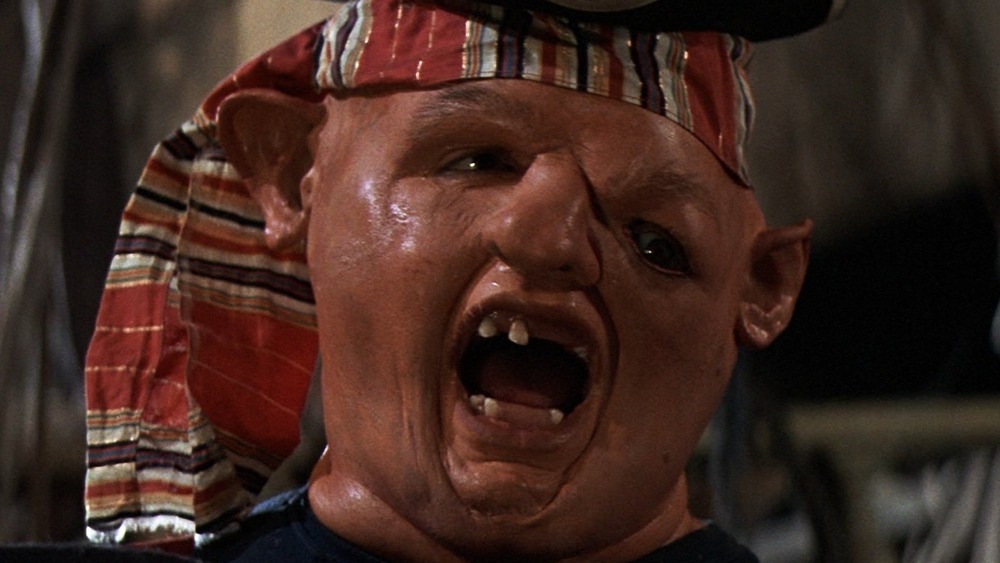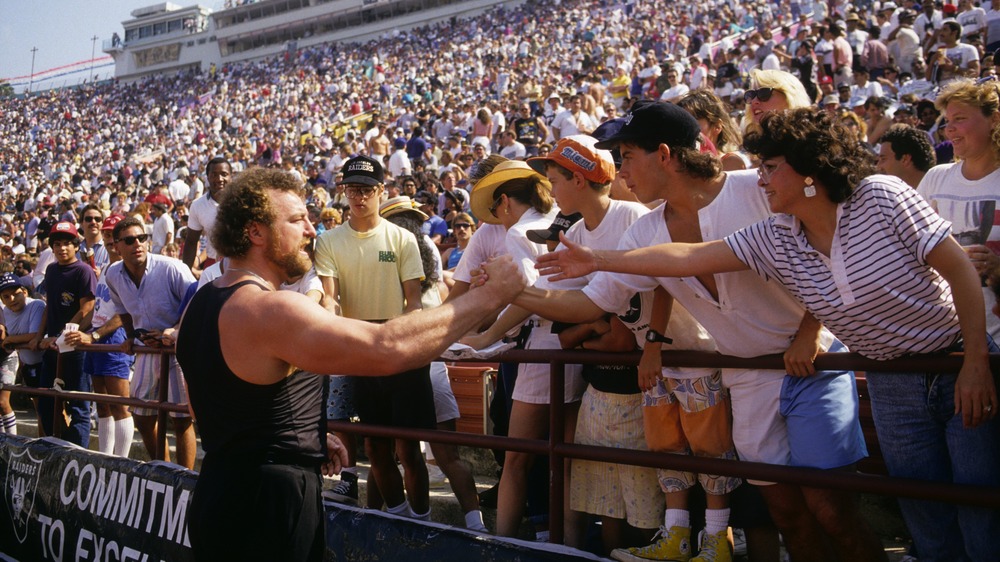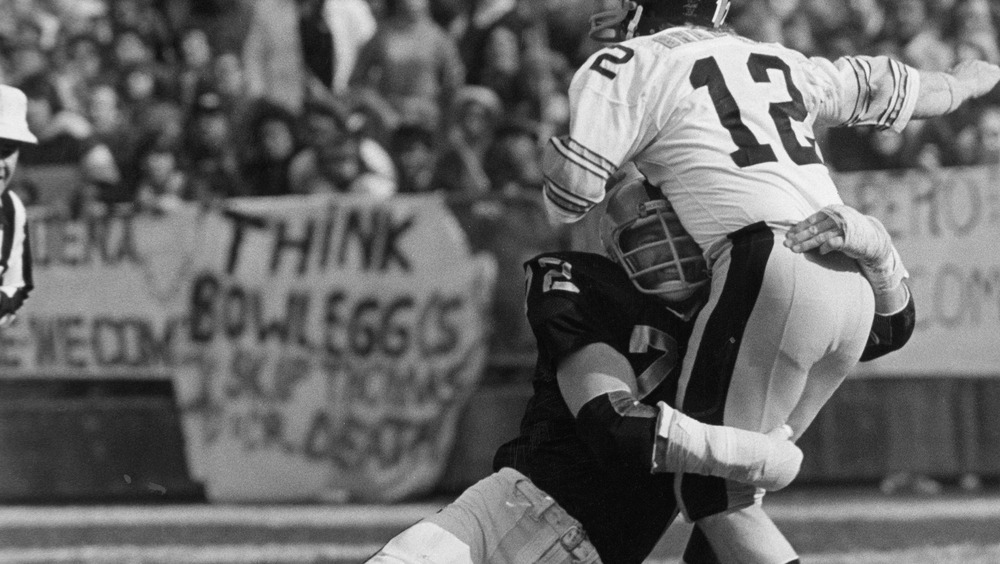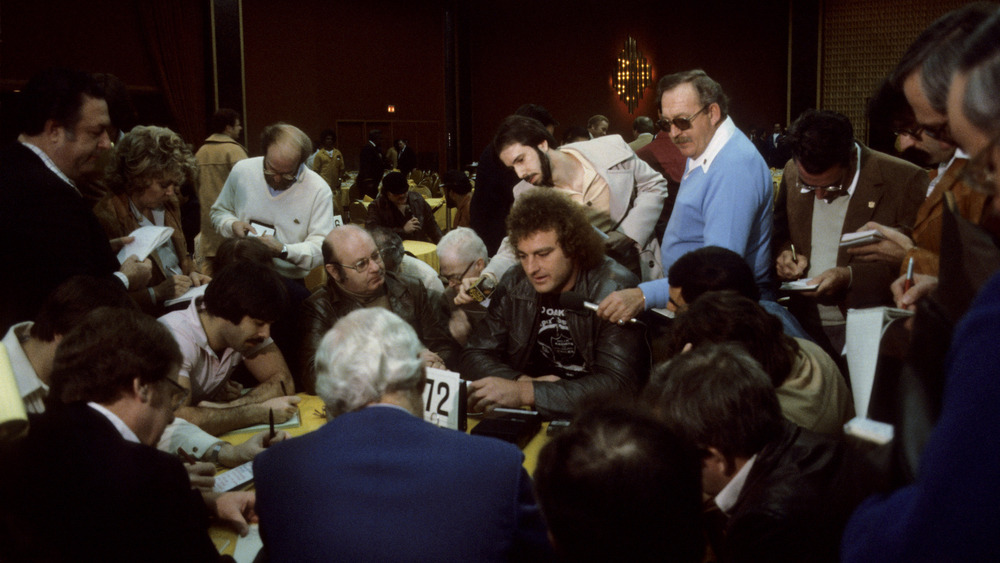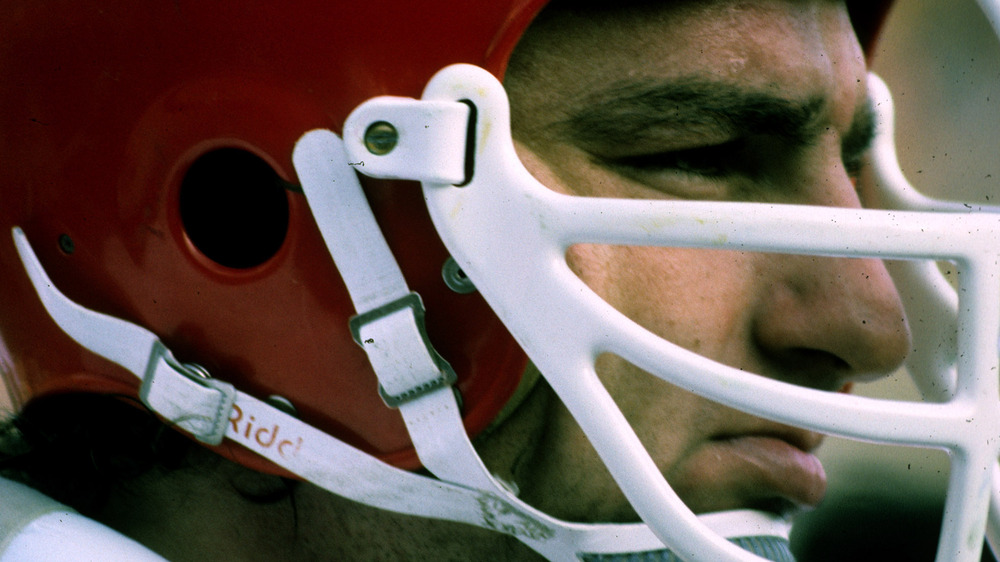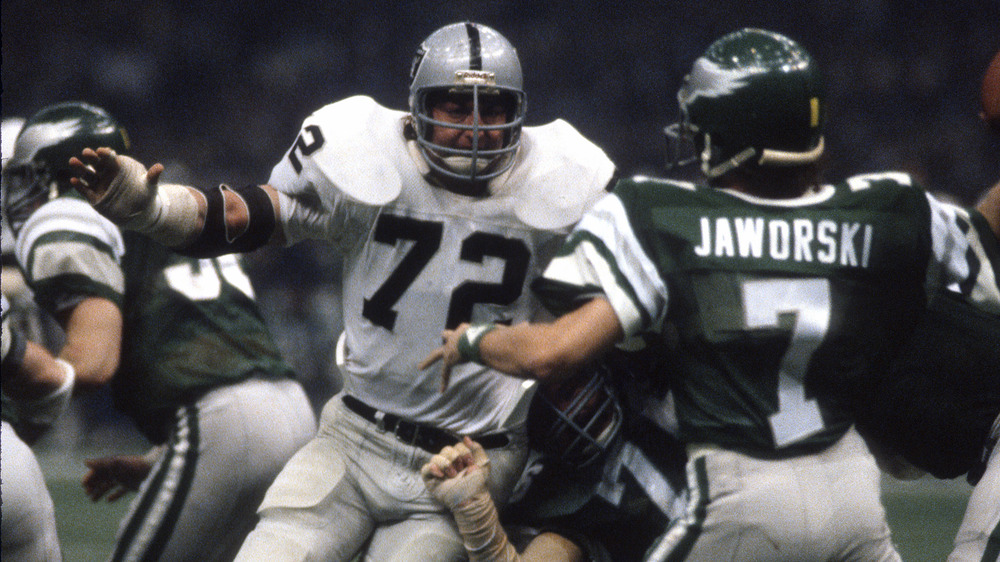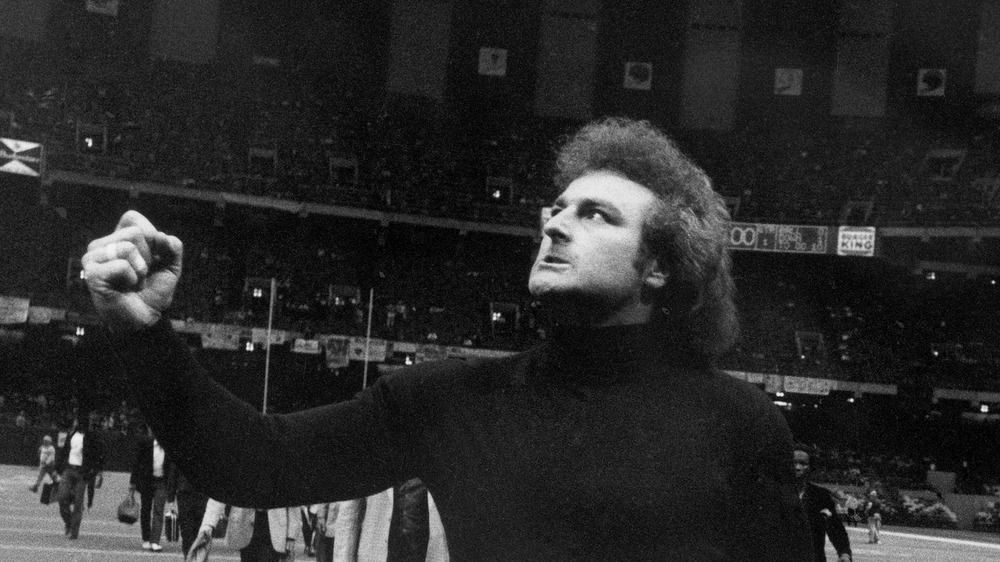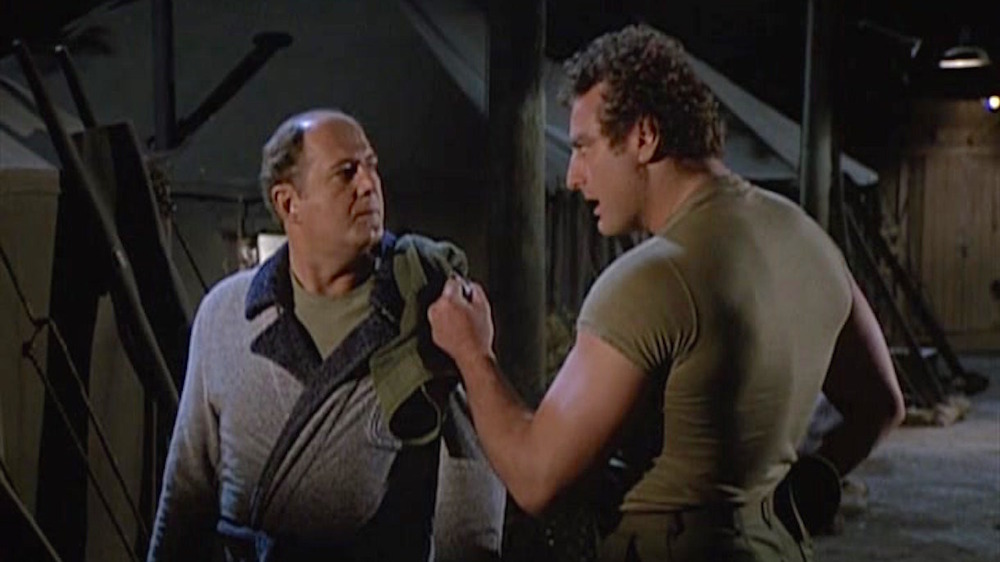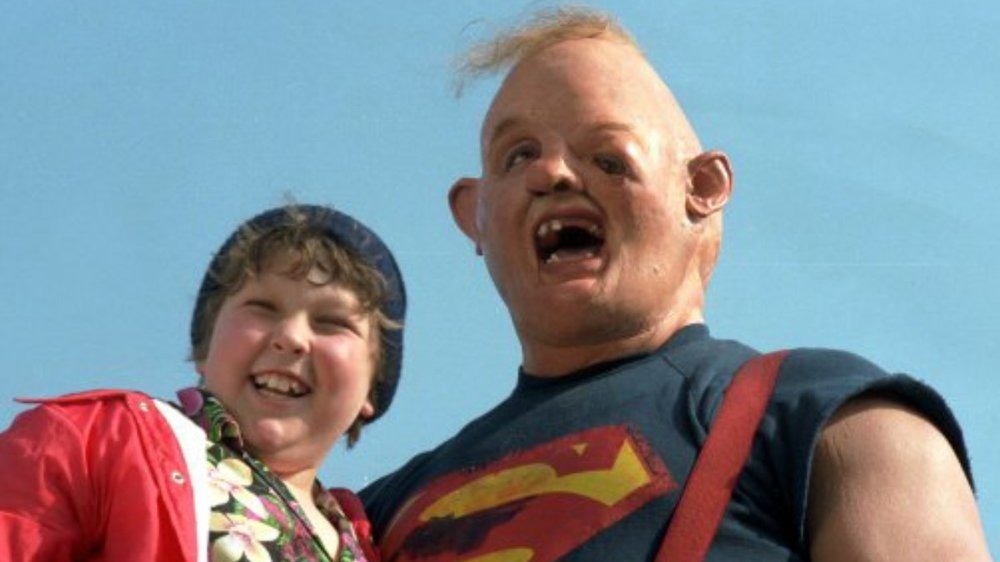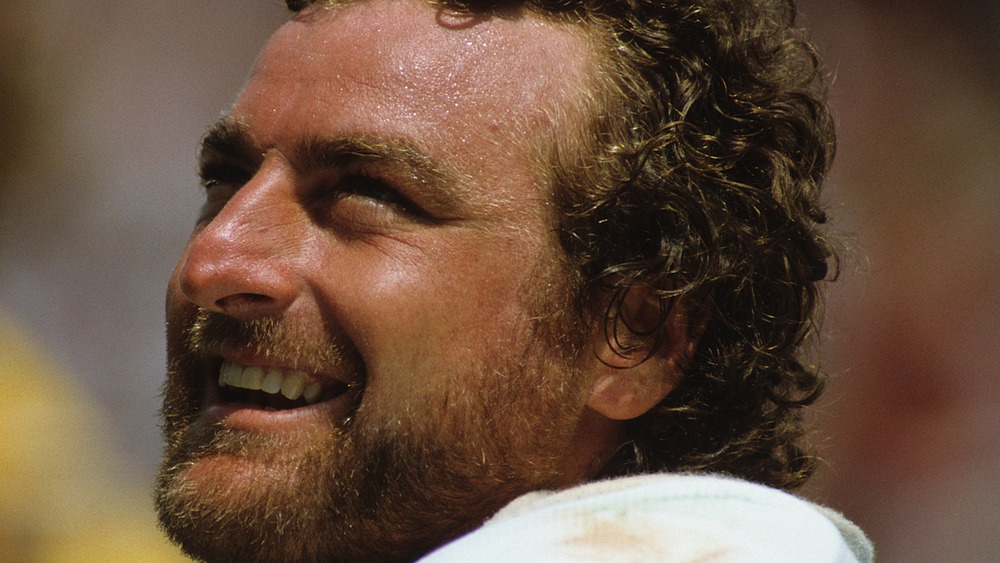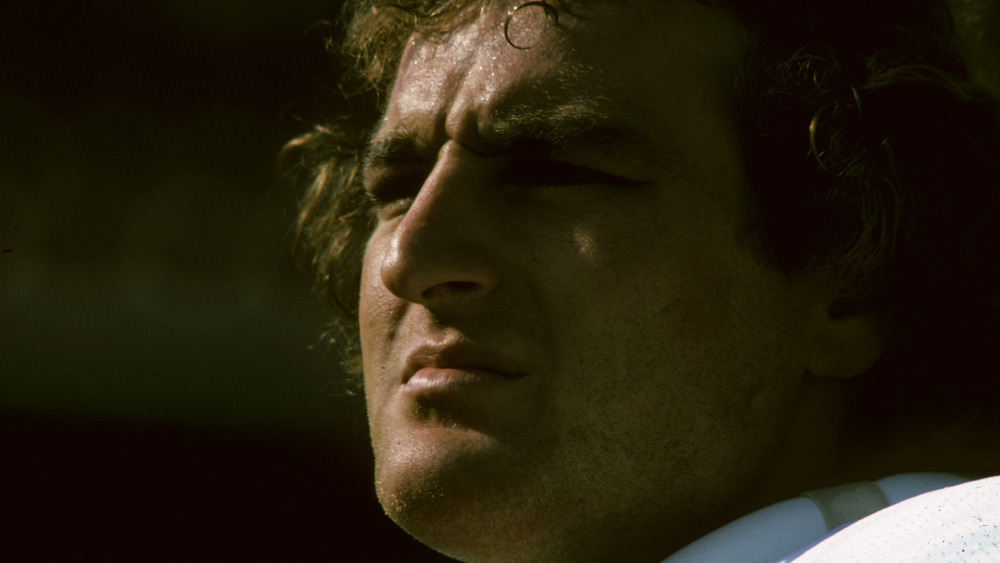Tragic Details About The Actor Who Played Sloth
John Daniel Matuszak was once a scrawny, awkward kid from the Midwest. Then he grew into a physical colossus, became a big-time California football star, and eventually, an out-and-out movie star. As his fame grew, so did his personality, which stretched way beyond the gridiron. Everything in his life was large: The wins on the field at any cost, the painkillers needed to offset those costs, the meals needed to sustain his lifestyle. Seriously: The man used to order half a dozen eggs and half a pound of bacon for breakfast, in addition to his steady diet of Cheez Whiz smeared on bagels.
Matuszak's life was a multifaceted one. How many men get to work under the genius of both John Madden and Steven Spielberg? How many get to win two Super Bowls and become famous as an iconic film character like Sloth? Sadly, Matuszak died of a drug overdose at the age of 38: His life was fully lived, but way too short. We're here to examine it, from his famous role in The Goonies to his time passing the pigskin.
A strongman's weak beginnings
As he details in his 1987 autobiography, Cruisin' with the Tooz, Matuszak, who was born in Milwaukee, loved his hometown. As a result, the city kid's world was rocked when his family moved to rural Oak Creek, Wisconsin. To make matters worse, he was a shy boy struggling with self-esteem issues and an awkward body: Matuszak was 6'1" by the age of 12. He prayed to stop growing, but he only grew taller. Nothing seemed able to stop the other kids from teasing him incessantly.
After seeing Steve Reeves play the title role in 1958's Hercules, he asked his parents for weights to bulk up his skinny frame. He started playing football in the eighth grade, and became a star in high school. The attention he so desperately wanted from his peers finally started to come. But his father, who had no interest in sports, showed him no affection — he attended only one of John's games. His dad only cared about his grades, and that's the one field where his son wasn't a champion.
Matuszak's family also struggled with a brutal history of cystic fibrosis. Two of his little brothers died of it: Christopher after two months of life, and David at the age of two years. This led to endless heartbreak, a crisis of faith, and trouble being around children going forward for Matuszak — their presence made him deeply sad.
College years
College football was the next logical step for Matuszak, but his 1.7 GPA wasn't good enough for his dream school, Iowa. So, he bulked up his grades at Fort Dodge, a junior college. He then transferred to the University of Missouri for Coach Dan Devine, with whom he had a tough relationship. It was with the Missouri Tigers that he had his first real injury. It was a minor separation of his shoulder, but Matuszak played through it, and paid the price in pain for years to come.
Matuszak's off-the-field troubles also started in college. At a crowded party, Matuszak caught sight of a student assaulting his girlfriend, and so he decided to pummel him. Turns out, the pummelee was an Air Force cadet who ended up with 18 fractures in his face — he needed a whopping 10 hours of surgery to be made whole again. Matuszak was suspended for the rest of the season and thrown out of his fraternity. Coach Devine left after that season, and the new coach didn't want Tooz around.
So it was off to the University of Tampa for Matuszak, an "outlaw school" where undesirables went to be desired. At Tampa, Matuszak switched from tight end to the defensive line, which brought out his true talents. Senior year accolades starting piling up, and NFL scouts started to take notice of this rising star.
Houston, we have a problem
To his own surprise, the Houston Oilers (now the Tennessee Titans) made Matuszak the number-one pick of the 1973 NFL Draft. Yet he ended up calling his time in Houston his imprisonment. For one thing, the Oilers were then the worst team in the NFL. When they offered the rookie a contract, they lowballed him. Then, when it was time to actually start playing, the pressure was almost too high for him to succeed. Tooz was a top pick, and the team was hoping he'd turn the moribund franchise around. Year one didn't go so hot: They won a single game, and lost 13.
His second season in Houston ended before it ever started. There was a players' strike, which he vocally supported, and the Oilers started to sour on him. This is when Matuszak believed his "bad guy" reputation began: The Tooz wanted out, but a trade was out of the question, so he knew he had to force the Oilers' hand. He signed up to play with the upstart World Football League's Houston Texans (no relation to the current team of the same name). The night after an exhibition game with the Oilers at the Astrodome, he had a game the next night at the same exact venue, with a different team, in a different league. All hell broke loose. The two teams sued each other, but in the end, Matuszak got his wish. He was traded ... to the Kansas City Chiefs.
Troubles on the field
Usually, starting with a new team brings about a fresh start. But when it came to John Matuszak, trouble seemed to follow him wherever he went. Kansas City was the next stop on the trouble tour, and it didn't exactly turn out to be a KC masterpiece. On a single day in the summer of 1976, he engaged in a wine-soaked tryst with a fan, came to practice tipsy, was sent home, went out drinking with teammates, attended an evening team meeting, was sent home again, went to a bar, took two sleeping pills, and blacked out. His heart momentarily stopped, and he came shockingly close to death. Though Matuszak survived, his career in Kansas City did not, and he was shipped off to the Washington Redskins. He was cut before the season began in 1976.
In his delightful and salacious biography, Sir Tooz summarizes his day job simply: "Football is a violent game and best played with a violent frame of mind." His career was indeed an endless stream of injuries. The minor ones, which he called "hangnails," included "bruises, cuts, groin pulls, twisted ankles, dislocated fingers, pulled hamstrings and slightly fractured bones." As a result, as he put it, "painkillers are a way of life in the NFL." You sit out a game and your replacement could steal your job, so you play with the pain ... which sometimes leads to even more injuries.
Troubles off the field
Matuszak enjoyed "enough parties for twenty people's lives", and especially lived it up during the season on Wednesdays, AKA "Tooz Day." His one-time roommate/babysitter, quarterback Ken Stabler, quoted John's recipe for fun in his own juicy biography, Snake: "Crown [Royal] and [Quaaludes], the late supper of champions."
Matuszak lived large during this era in his career, but it wasn't all beautiful women and parties at Hugh Hefner's place. "Car troubles" could have been the name of his biography: He amassed a long rap sheet of arrests, including ones for aggressive driving, careless driving, possession of drugs, and drunken driving. One of these offenses killed a pending endorsement deal that would have seen him appear in beer commercials. Matuszak also did a three day stint in jail for carrying a concealed weapon. It was a rough and wild time in his life — one that cast long shadows.
Bound for glory
After being cut by the Redskins, Matuszak's football career was in limbo. His bad boy reputation had few teams lining up to offer him a job. Enter Oakland Raiders maverick owner Al Davis, who decided to take a chance on Matuszak. The team was seen as a bunch of rebels, and Matuszak's similar attitude and outlook were a perfect match. He also couldn't have asked for a better coach either, as he finally found one he could respect and play even harder for: The one and only John Madden.
Matuszak's days of losing were over: One season in, and he was already Super Bowl bound. The Raiders ended up taking down the Vikings in Super Bowl XI. Madden retired two years later, and was replaced with Tom Flores. The winning continued, and they got back to the promised land in 1979 for Super Bowl XV in New Orleans. New Orleans isn't the easiest place to be free of distractions, and while most players resisted the city's temptations, the Tooz just couldn't help himself and partied himself into unconsciousness. It didn't make a difference, as the Raiders became the very first wild card team to ever win the Super Bowl by beating the Philadelphia Eagles 27-10.
You don't quit football — football quits you
The following season, the Raiders weren't able to repeat their success, and by 1982, Tooz's body was telling him it was time to wrap up his career, even if he didn't want to. He started to get terrible back spasms and tried to play through them, but not even injectable painkillers dulled their edge. After several tests, it was revealed that he had a herniated disc in his lower spine, and so Matuszak was placed on the injured reserve list. The pain in his body almost equaled the pain of not being able to be with his teammates on the field.
Matuszak actually came close to recovering and making a comeback, but he reinjured himself in 1983 trying to dodge a puppy on a beach. He was back to square one of rehabilitation. Matuszak reflected, in this moment, upon how deeply affected he had been by seeing Muhammad Ali on TV after Ali's career had taken a physical toll and made the legendary boxer into a shell of his former self. Tooz decided he didn't want to end up like that, and called it quits on May 10, 1983.
Boredom set in quickly: He was alone and depressed, desperately missing the joy and structure of football. Still, he was happy to be free of the painkillers, and being black and blue on Mondays. And his next career was already in motion.
Acting up
Matuszak was bit by the acting bug as a kid, when he saw James Dean getting paid to be cool in Rebel Without a Cause. His debut came in 1979's North Dallas Forty: Matuszak's role as offensive lineman O.W. Shaddock received high praise from critics. His next role was in 1981's Caveman, opposite Ringo Starr, which no critic "confused [with] Gone With The Wind." Still, it was fun — especially since Matuszak was a devoted Beatles fan. In between these early acting gigs, he found time to unwind and undress for Playgirl in 1982. That's right: The Tooz got nude.
He swiftly became a man in demand, appearing in a hodgepodge of '80s awesomeness like M*A*S*H, Ice Pirates, The Dukes of Hazzard, Silver Spoons, The A-Team, Miami Vice, and Perfect Strangers. He had a three-episode stint opposite O.J. Simpson on HBO's 1st & Ten, until his 'roided-up character died of a heart attack on the practice field.
Like a Sloth to the flame
In late 1984, Matuszak met with director Richard Donner, who was deep into casting The Goonies. Right away, Donner could tell he was perfect for the role of Sloth, a disfigured and abused son with a heart of gold. Matuszak was enormously excited to work with Donner and producer Steven Spielberg, whom he called "the Al Davis of Hollywood."
His part was more complex than he could have imagined. He had to spend five hours a day in the make-up chair getting into character. His mask had 15 overlapping pieces to it, including electronic eyes and ears. He wasn't allowed to leave the set, for fear of outsiders seeing him in costume, so he did a lot of sitting around. On top of everything, the adhesives and prosthetics aggravated his skin. Still, it was worth it, according to Tooz. The chance to work with Donner and Spielberg was once-in-a-lifetime.
Matuszak tried to take it easy on his back while filming. But he still managed to surprise Jeff Cohen, who played his onscreen buddy Chunk, by picking him up while strapped in a chair and kissing him. Cohen's reaction is captured forever in the movie. That's right: As Cohen describes it, the "shock and horror" on Chunk's face in that moment is real.
The end of the road
Matuszak knew he had an obsessive personality, and tried to fight it when he could. He sought help for both his drug and alcohol issues, and though he often relapsed, he got back on the horse multiple times. In his book, Matuszak recalls meeting people who served as examples of how he didn't want to live. One of these walking object lessons was John Belushi. Matuszak actually met John Belushi five days before Belushi died, and saw how bent out of shape he was. His death made a huge impact upon Matuszak — so huge, it couldn't be overshadowed by the fact that Matuszak met Richard Donner the very same night he met Belushi.
Seven years later, Matuszak would join Belushi on the list of actors who died in their prime. On June 17, 1989, John Matuszak died at age 38. Although there was a trace of cocaine in his system, the cause of death was an accidental overdose of the prescription drug, Darvocet — a drug he was actually prescribed and took that very morning. An enlarged heart and pneumonia were also contributing factors in his demise. Darvocet was eventually banned by the FDA in 2010 for having dangerous side effects.
The Tooz's legacy
John Matuszak got into quite a bit of trouble in his life. He was no fan of the press, as the press always fed on his exploits, leading to the perception that he was a real "bad dude." However, whenever anyone met him, worked with him, or enjoyed life with him, they came away knowing he was a giving person and a gentle giant.
After losing his brothers during his childhood, being around children was always a painful experience for Matuszak. He enjoyed the company of kids, but afterwards, they made him feel depressed. One year, while with the Raiders, he played Santa Claus at a children's hospital, and the emotions that came with it changed his mind and outlook. He started to devote a lot of time to working with kids and charities, and spent many hours with his beloved nieces and nephews as well.
Matuszak never had any children. But what he didn't give the world in offspring, he gave in winning memories for Raiders fans, and a unlikely movie hero for legions of '80s children who wanted Sloth to be their big buddy. His life may have been a rocky road, but the Tooz cruised through it, and there was rarely a dull moment along the way.
